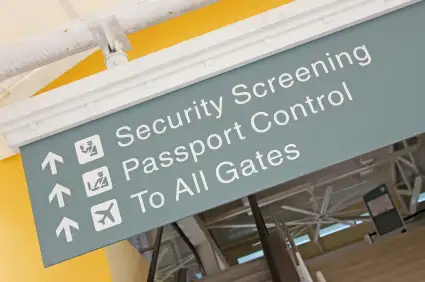
In public remarks yesterday, Department of Homeland Security (DHS) Secretary Janet Napolitano outlined changes her agency will make to upgrade and increase airline security. She focused on five basic areas, some with specific, actionable solutions:
- Strengthen the no-fly list: “First, there needs to be a reevaluation and modification of the criteria and process used to create the terrorist watchlists. This will involve the Department of Homeland Security and other members of the intelligence community. Specifically the effort will include evaluating the process by which names are put on the ‘no fly’ and selectee lists.” This has already begun, with dozens of individuals moving from the 550,000-person watchlist to the much smaller 3,700-person no-fly list.
- Improve existing screening technology: “We will establish a partnership on aviation screening technology between DHS and the Department of Energy and its national laboratories. This will allow government to use the expertise that the national labs have to develop new and more effective technologies, so that we can react not only to known threats, but also to proactively anticipate new ways by which terrorists could seek to board our aircraft.”
- Deploy body scanners, and fast: “We should accelerate deployment of advanced imaging technologies, so that we have greater capabilities to detect explosives like the ones used in the Christmas Day attack. We currently have 40 machines deployed throughout the United States. In 2010, we are already scheduled to deploy 300 more. We may deploy more than that.” Earlier yesterday, President Obama allocated $1 billion for the accelerated deployment of this equipment. Napolitano also emphasized international cooperation on the issue of airport screening, saying, “We have to do all that we can do to encourage foreign authorities to utilize the same enhanced technologies for aviation security. After all, there were passengers from 17 countries aboard Flight 253. This is an international issue, not just one about the United States.”
- Boost security presence: “We have to strengthen the presence and capacity of aviation law enforcement on top of the measures we have already taken. This includes increasing the number of federal air marshals. And we will begin by deploying law enforcement officers from across the Department of Homeland Security to help fulfill this important role.”
- Make sure the rest of the world is on board: “Working with the Secretary of State, we need to strengthen international security measures and standards for aviation security. Security measures abroad affect our security here at home.”
Most of these conclusions are old news, and the rest (like investing in developing technology) are obvious. And, more importantly, DHS’s plans seem logical. The no-fly list definitely needs a tweak, and bomb-detection should be priority number one when it comes to passenger and baggage screening (though I’m still on the fence about whole-body imaging scanners). And, certainly, we need to make sure countries sending planes to the U.S. adhere to a level of security awareness that matches our own.
But looking at the DHS’s recommendations, I’m a bit disappointed by what appears to be a “more is better” mindset, when what we really need is a smarter, more intuitive approach. Find the terrorist, not the weapon, as Patrick Smith told me recently. I would have liked to see DHS launch an assertive behavioral profiling program, training screeners to look for signals and signs in passengers’ faces, voices, and body language. DHS’s focus is understandably on its role as the last line of defense, but considering an extremely determined would-be bomber could find ways to circumvent even the most high-tech screening equipment, my feeling is that picking these individuals out of the crowd should be a top priority. In some ways, the cumbersome 14-nation policy could be a step toward a more sophisticated analytical security process, but that remains to be seen.
But something, anything, needed to be done, and the tone of everyone involved—from Obama on down—suggests this is not a fix-it-and-forget-it situation. And good thing, because the threat of airborne crime, terrorist or otherwise, is not going away.
We hand-pick everything we recommend and select items through testing and reviews. Some products are sent to us free of charge with no incentive to offer a favorable review. We offer our unbiased opinions and do not accept compensation to review products. All items are in stock and prices are accurate at the time of publication. If you buy something through our links, we may earn a commission.
Related
Top Fares From Columbus, OH
Today's Top Travel Deals
Brought to you by ShermansTravel
Shop and Save with Country Inns...
Patricia Magaña
 Hotel & Lodging Deals
Hotel & Lodging Deals
$229 -- Chicago: Discounted Rates and...
Francesca Miele
 Hotel & Lodging Deals
$229+
Hotel & Lodging Deals
$229+
$188 -- Honolulu: Save on Oceanview...
Abigail Lamay
 Hotel & Lodging Deals
$188+
Hotel & Lodging Deals
$188+



